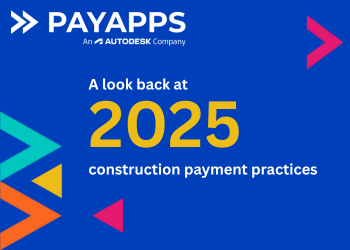Back In 2015, Construction News conducted a survey to understand the current state of payment in the construction industry, in which 35.8% of respondents said their average wait for payment was more than 60 days after an invoice was raised.
That statistic should be alarming enough, however, very worryingly, 85% admitted to occasionally paying more than 75 days after receiving an invoice.
This was all set against the backdrop of a skills crisis, weak productivity, low margins and rising insolvency.
This was not news. Late payment had plagued the construction industry for years. So much so in fact, that since 2004, 19 separate payment initiatives (charters, codes, regulations and legislation) have collectively failed to resolve the problem.
So why then, when we understood that these critical industry issues were linked directly to being paid promptly, did we stand by and watch 133 small business go into insolvency in just the first half of 2015 alone?
A changing tide
Since that survey in 2015, I would argue that more has been done in the last four years, than in the preceding fifteen.
That 2015 survey covered the merits of the Prompt Payment Code (PPC). Originally created in 2008, the PPC is a voluntary initiative administered by the Chartered Institute of Credit Management on behalf of the Department for Business, Energy and Industrial Strategy (BEIS).
Its aim is to ensure that signatories pay 95% suppliers within 60 days (working towards 30 days by 2018) and give clear guidance to them and encourage good practice throughout the supply chain.
Responding to the survey, a supply chain director, said however “The PPC is about having contractual teeth but the problem is, it doesn’t have any. The issue being avoided is that there are no ramifications for late payment.” One transport infrastructure finance adviser also questioned the PPC, asking, “Who will ever enforce the code?”
One subcontractor said the code needed ‘better policing’ on public sector contracts: “The government should audit how fast their contractors are paying their suppliers rather than just take their word for it.”
Then, in 2018 one of the signatories, Carillion collapsed, making a mockery of the PPC.
The PPC, like the other payment initiatives, had fallen into the trap of trying to change a culture without establishing consequences for poor practices.
In a Lords debate last May, Lord Mendelsohn summed it up when he said: “Practices have to change the culture, not the culture change the practices.”
But it seems that someone was listening…
Earlier this year, Cabinet Office minister Oliver Dowden wrote to government suppliers reminding them that a new late payment crackdown is coming in September.
If policy and legislation have failed to change the culture, one way to change practices is to link it to a business imperative.
From September 2019, companies that don’t pay at least 95% of undisputed invoices within 60 days face being barred from public sector contracts worth more than £5m.
This will require a large amount of administration, but it’s a real statement of intent.
Better communication
In 2017, the ‘Duty to Report Payment Practices’ legislation was launched – but there’s been talk of publicly naming and shaming contractors for many years and finally we have the transparency of payment we’ve all wanted.
But even better than that, just a couple of weeks ago, the PPC finally grew the ‘teeth’ that those respondents back in 2015 wanted.
For the first time, some 11 years after it was introduced, the Prompt Payment Code kicked out 5 of its signatories for falling foul of the key KPI – paying 95% of all invoices within 60 days.
The proportion of invoices paid within 60 days by the five contractors ranges from 86% down to 59%, way short of the required 95%.
Whilst being a signatory of the PPC is separate from the Government ruling on public sector contracts, being suspended from the PPC will no doubt have a critical bearing on these firms’ ability to win public sector contracts.
CICM chief executive Philip King (who administers the code) said, “…we will continue to challenge signatories to the code if the obligatory Payment Practice Reporting data suggests that their practices are not compliant with the code.”
However, according to Specialist Engineering Contractors’ Group chief executive Rudi Klein, suspension from the Prompt Payment Code (PPC) will not stop these contractors from getting work. Rudi Klein said that the code is “an utter waste of time. The fact is they will still get work. Sign up or not, it has not made a difference to prompt payment in the industry.”
Mr Klein suggests that “legislation is needed to make a real difference” and called for the mandatory use of project bank accounts.
Whilst the walls seem to be closing in on poor payment practices and some great progress is being made, we’re never far away from another saddening example of the frailties of the construction supply chain.
The cycle continues
In March 2019, Dawnus, a Wales-based main contractor filed for insolvency, and just like Carillion, nearly all work was sub-contracted at the direct cost of their supply chain.
“Nearly all the work carried out by Dawnus was outsourced to SMEs which will now bear the brunt of the losses from insolvency,” said Catherine Griffiths-Williams, national executive officer speaking on behalf of SEC Group Wales/Cymru.
“Again, this highlights the financial fragility of the large construction firms and the consequent risks to their sub-contractors, which could now lose millions of pounds.”
So, how do we sum up the state of payments in 2019?
Business as usual? Significant progress?
It depends on your perspective, and I’m sure if you were one of Dawnus’ supply chain, you’d suggest the former, but as an outsider looking in, I’d conclude that for the first time, we’re seeing real progress.
Mandatory reporting, the strengthening of the PPC and the Government contract ruling, all give great momentum to the cause of curing the curse of late payments, but as with any initiative, the proof is in the implementation.
With the complex nature of construction, coupled with the manual administration process associated with payment, it certainly won’t be an easy nut to crack.




